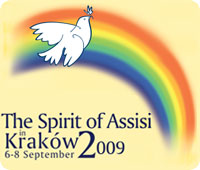
YMCA, Allemagne
|
Honourable guests
Dear friends
I am very happy, that as a representative of the spiritual movements, I may give a contribution to this important subject.
I want to focus my statement on the Christian Faith with Protestant background, because the key for our togetherness lies in the complementation of different views. At the same time, the closeness to the Jewish position becomes clear when I refer to passages from the Old Testament – the Torah.
The texts from the Bible show us God as the creator. To Him we owe our lives. Beginning and end of life are in God’s hands. The person who prays Psalm 104 says it in that way: “When you take away their breath, they die and return to dust. When you send your spirit, they are created.”
It is clear and evident: life is not disposable.
Genesis 9, 5-7 expresses God’s sovereign right about human life (see also Ezekiel 18, 4). Gerhard von Rad, a professor for the Old Testament, writes: “The human life is per se inviolable and not because of the sake of men, not because of any law of humanity … but because man belongs to God and is created in the image of God.”
God as the creator of life puts life into his life-giving orders, which we know as the 10 commandments. The clear instruction of God “you shall not kill somebody” marks a limit to the human liberty, in regard to one’s own life as well as the lives of others. Life remains under God’s availability und may not become an option to men or fall under his disposal and his interests.
For living together successfully – and for this the orders of God are meant – blessings are flowing and along with it happiness and life - if we live in His orders.
We experience the opposite, reduction of life – which is also described as curse – if we do not act according to them (Deuteronomy 30, 15.19).
The New Testament witnesses in Johns Gospel that Christ himself is the life.
He as the eternal logos is the life himself and the genesis of life. Christ is the true life and in Him we have life.
Saint Paul’s understanding of life is basically shaped by the resurrection of Jesus from the dead (1. Cor. 15, 4) . This shows us the important dimension of eternal life in our Christian faith.
The first letter of John connects the question of life and our relationships with others. There we can read (1. John 3, 14) that loving our brothers is the true life.
Jesus Christ himself requests us not only to love our brothers but to love our enemies. What Jesus expressed in his sermon on the mountain about loving enemies is revolutionary for the living together of men. Jesus gets to the point of our real living together with the golden „In everything, do to others what you would have them do to you.”
Please allow me to mention some practical consequences from what I said before:
1. Regarding Our Living Together
This golden rule is a great help to estimate others and their lifestyle. If we were able to really practise that rule, our living together would look different.
If we consult wikipedia we can see that this rule is part of all religions. If we were able to promote that wisdom in all religions through this prayer for peace, it could be a great help for us to gain estimation of the life of others.
How much suffering would have been avoided for the nations of Europe in regard to the two world wars, if the call of Jesus to love our enemies and to reconcile had been considered?
2. The unavailability of life, especially at the beginning and at the end of life
This question seems to be up to date in a special way. In the western countries we live in a spirit of time which denies the responsibility to God more and more. With the denial of a godly authority above us, with the denial of a creator who created us in his image and who emphasizes the unavailability of human life, our human life gets relativized.
The human being as the last authority doesn’t stop before life. The protection of life becomes relativized. The debate about euthanasia shows us very clearly that suddenly the value of life has to compete with the will of freedom. Is my personal freedom to put an end to my life, if it doesn’t seem worthy to be lived any more, to be estimated in the same way as the unavailability of life?
We Germans experienced it in a very dramatic way during the time of National Socialism what happens if we do relativize these limitations.
„Unworthy life“ is a shocking word with which people judged on which life was worthy to be lived or not:
• People with physical or mental disabilities
• People of a certain race
When we travel to Auschwitz tomorrow we may become clearly aware of how terrifying this human delusion was. How was it possible? How could people with a Christian background have such thoughts and commit such horrible deeds?
The faith was darkened and deformed by ideology. Human beings became the final authority to decide about life and death, about worthy and unworthy life.
After this fright of the Hitler regime I could not imagine that we would ever again enter into such a deformation. But I can see how the spirit of time denies the final authority of God and so the human being with its disposal becomes the final authority again. Already today it is unfortunately reality:
- Disabled life faces abortion, many times until few weeks before the date of birth. Prenatal diagnosis is an instrument to avoid such kind of life which would be too much a demand to anybody. Unworthy life?
I think of my friend Egon, spastically disabled. Today he would not be allowed to come to life.
- Millions of children are victims of abortion every year. It can already be noticed in our society what is described in Deuteronomy 30: „If you do not obey the commandments of God, it will turn to curse“. A culture of death is obvious, at least in Western Europe. The decrease of population is a result of that negation of life.
- In a special way I can see that we have to face the debate about euthanasia. I feel that we as Christians have lost the debate about abortion.
Will our society do the next step towards the culture of death and relativize the end of life in the same way?
The awe to our creator, who kept the right over life to himself, prohibits this step to us.
- Are we already so much deformed about the value of life that we do not have the power to stand up against it?
- Will it be like this, that in 30 years it may be immoral to become older than 80 years and live at the cost of the few young people? Will then a life beyond 80 years and with certain diseases not be worthy to be lived any more?
I am deeply convinced that the awe to our creator, who created us, can prevent us from the delusion that the human life is available and can be put on the same level with the right to self-determination.
In our message of Together for Europe we have expressed a 7-folded Yes.
Yes to life in all its phases from beginning to the natural death is part of it.
I am deeply convinced that all religions know this awe and dedicate all their energy to preserving the value of life.
With the background of the madness of the Second World War und the concentration camps – may these days here give us the strength to avouch for the value of life.
|

